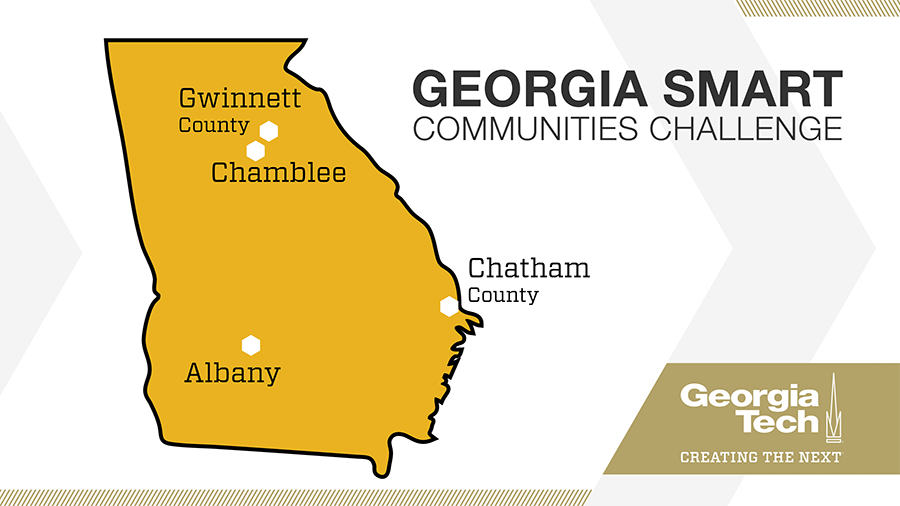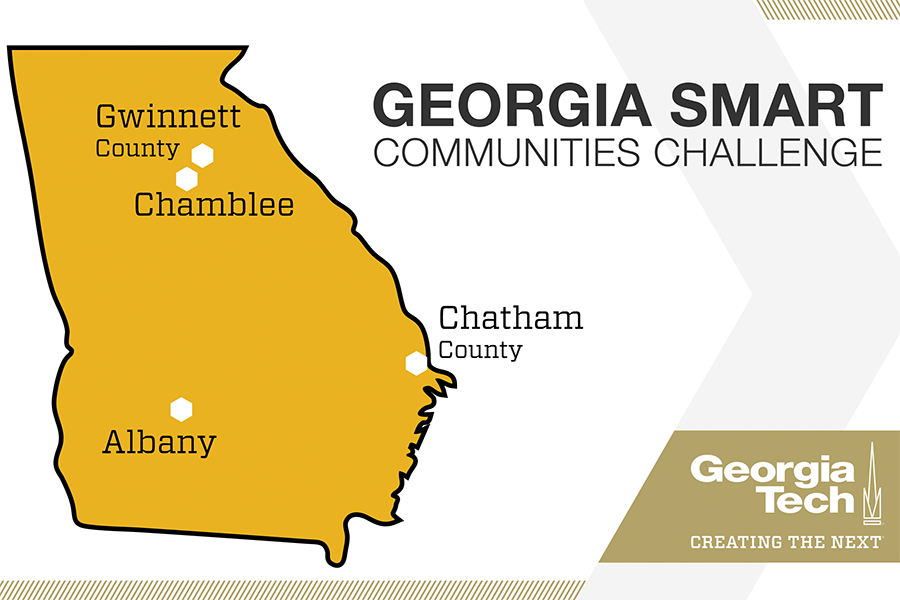 |
By Laura Diamond, Georgia Tech News Center
School of Civil and Environmental Engineering researcher Angshuman Guin will lead research efforts in a new partnership with Gwinnett County announced June 12 to improve vehicle mobility and reduce crashes.
Gwinnett is one of four Georgia communities that have developed and will implement smart design solutions to some of the biggest challenges facing the state through the Georgia Smart Communities Challenge.
This new Georgia Tech-led initiative brings together industry and public agencies to help local governments implement smart development. The projects tackle housing, traffic congestion, sea level rise and shared autonomous vehicles, and the strategies developed by the selected communities will serve as models that could be implemented elsewhere across Georgia.
The program provides seed funding and access to technical assistance, expert advice and a network of peers. A Georgia Tech researcher will advise and conduct research in support of each group’s goals.
The winning proposals are:
- Albany Housing Data Initiative. Led by the city of Albany the project will evaluate an automated housing registry. The system will allow for improved neighborhood infrastructure and revitalization and encourage a safe and sustainable housing inventory for the city. Assigned Georgia Tech researcher: Omar Isaac Asensio, assistant professor in the School of Public Policy.
- Shared Autonomous Vehicle Study. Led by the city of Chamblee the project will study improvements in mobility through the use of autonomous vehicles that travel from MARTA stations into the community. This will reduce road congestion and increase pedestrian and traveler safety. Assigned Georgia Tech researcher: Ellen Dunham-Jones, professor in the School of Architecture.
- Smart Sea Level Tools for Emergency Planning and Response. Led by Chatham County, this project will develop and test a pilot sensor network for measuring sea level flood risk during natural disasters and storms. The network will improve flood warnings, emergency response action plans and predictions for future flood events. Assigned Georgia Tech researcher: Kim Cobb, Georgia Power Chair and professor in the School of Earth and Atmospheric Sciences.
- Connected Vehicle Technology Master Plan. Led by Gwinnett County, this project will evaluate traffic management technologies for improved vehicle mobility throughout the region. The technology will improve safety and connectivity. Assigned Georgia Tech researcher: Angshuman Guin, senior research engineer in the School of Civil and Environmental Engineering.
“Georgia Tech is excited at the opportunity to collaborate with four of Georgia’s dynamic communities in this inaugural Georgia Smart Communities Challenge,” President G.P. “Bud” Peterson said. “The enthusiasm for this new program has been gratifying, and we look forward to seeing how Georgia Tech’s research expertise and the communities’ vision of smart development mesh together to improve the lives of their citizens. These groundbreaking projects have the potential to become models for other communities around our state.”
Georgia Smart supports communities of all sizes, including smaller towns, which may not have been as prominent in smart development because of a lack of resources. Seventeen communities applied for the program.
While each selected team is led by a local government, the work will be a collaboration between different government agencies and nonprofits.
The teams will each receive $50,000 in grants and $25,000 from Georgia Tech in researcher support. The selected communities each raised an additional $50,000.
| GEORGIA SMART COMMUNITIES CHALLENGE PLANS | |
|
Albany Housing Data Analytics and Visualization Initiative
Lead: Albany Collaborators: Department of Community and Economic Development; Dougherty County; Albany, Georgia Initiative for Community Housing; and Fight Albany Blight This initiative seeks to bridge the gap between available data and the need for a comprehensive, flexible and accurate database to effectively manage the Albany housing inventory. The end result will allow a better measurement of public funds allocated for housing and neighborhood structure repairs and enhancements, using an automated data analytics and visualization tool. The initiative also allows the city and its collaborators to engage with residents and become part of the solution to the communities’ housing issues.
Smart Sea Level Tools for Emergency Planning and Response
Lead: Chatham County Collaborators: Savannah and Creative Coast This project will develop and test a pilot sensor network for measuring sea level flood risk during natural disasters and storms. Sea level rise presents a risk to coastal communities and those risks become more pronounced during hurricane landfalls when extreme flooding exacts a major toll on public safety and key infrastructure. The proposed sensor network will improve flood warnings, emergency response action plans and predictions for future flood events. This project is considered the first of its kind for the region and the expectation is it will serve as a model for future smart designs along Georgia’s coastline.
|
Shared Autonomous Vehicle Study
Lead: Chamblee Collaborators: Doraville, MARTA, Stantec and Assembly Community Improvement District (CID) This project will study improvements in mobility through the use of shared autonomous vehicles, which travel from MARTA stations into the community. This option will reduce road congestion, increase pedestrian and traveler safety and improve equity in the community. While the project will look at challenges surrounding the “last mile” – getting from a transportation hub to a final destination – there will be additional implications. The research will look at the potential impacts of autonomous vehicle technology on land use, attracting residents and employees, expanding access to MARTA, prioritizing pedestrian and bike mobility; and improving public health.
Connected Vehicle Technology Master Plan
Lead by Gwinnett County Collaborators: Berkeley Lake, Duluth, Norcross, Suwanee and Georgia Department of Transportation This project will evaluate traffic management technologies for improved vehicle mobility throughout the region. It will use the latest technological advances in traffic management systems to improve traffic congestion and reduce crashes along the Peachtree Boulevard corridor. In addition to modeling how to set up a connected vehicle system, this project will help agencies charged with new traffic safety and mobility to manage expectations and costs, and fully realize the benefits of these new technologies.
|
Georgia Power is the lead sponsor of the program, with additional financial support from the Atlanta Regional Commission.
“At Georgia Power, we’re committed to investments in smart technologies and collaborative partnerships that improve service to our customers, as well as the quality of life in local communities,” said Latanza Adjel, vice president for sales at Georgia Power, who leads the company’s efforts in energy efficiency and other areas. “We’re proud to have worked with some of the most innovative public leaders in the state as part of this project, and congratulate the winners of the Smart Communities Challenge for exploring and embracing new technologies that can benefit thousands of our Georgia neighbors.”
Doug Hooker, executive director of the Atlanta Regional Commission, noted the diversity and quality of the applications for the program. The winners emphasized a highly collaborative approach that includes working across multiple jurisdictions and agencies, he said.
Additional partners include: Association County Commissioners of Georgia, Georgia Centers for Innovation, Georgia Chamber of Commerce, Georgia Department of Community Affairs, Georgia Municipal Association, Global City Teams Challenge, Metro Atlanta Chamber and Technology Association of Georgia.
Work on the projects will begin in September and continue through September 2019.
“The four selected communities show cities of all sizes can work on smart development and that these projects are strongest when done through collaboration,” said Debra Lam, managing director of Smart Cities and Inclusive Innovation at Georgia Tech. “Other cities will not be excluded from the broad Georgia Smart community as we remain committed to supporting smart development across the state and beyond.”

